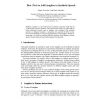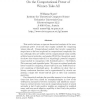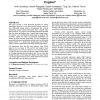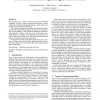1199 search results - page 6 / 240 » How to Compare the Power of Computational Models |
NIPS
2004
2004
Methods for Estimating the Computational Power and Generalization Capability of Neural Microcircuits
15 years 1 months ago
What makes a neural microcircuit computationally powerful? Or more precisely, which measurable quantities could explain why one microcircuit C is better suited for a particular fa...
103
click to vote
ADS
2004
Springer
15 years 5 months ago
2004
Springer
Laughter is a powerful means of emotion expression which has not yet been used in speech synthesis. The current paper reports on a pilot study in which differently created types of...
ECCC
2000
14 years 11 months ago
2000
This article initiates a rigorous theoretical analysis of the computational power of circuits that employ modules for computing winner-take-all. Computational models that involve ...
DAC
2005
ACM
15 years 1 months ago
2005
ACM
This paper presents a novel placement algorithm for timing optimization based on a new and powerful concept, which we term differential timing analysis. Recognizing that accurate ...
110
click to vote
ERLANG
2006
ACM
15 years 5 months ago
2006
ACM
Termite Scheme is a variant of Scheme intended for distributed computing. It offers a simple and powerful concurrency model, inspired by the Erlang programming language, which is ...




